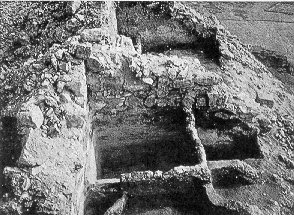 When you look through the 613 Mitzvot that govern Jewish life, three of them are specifically for women. It covers lighting of the candles, consecrating the first Sabbath bread cake, and observing the laws of ritual purity.
When you look through the 613 Mitzvot that govern Jewish life, three of them are specifically for women. It covers lighting of the candles, consecrating the first Sabbath bread cake, and observing the laws of ritual purity.
What Is Ritual Purity?
Ritual Purity, known as the ‘Mikvah’, means a “collection of water”. It is a ritual bath used for spiritual purification. Going back to the old times, men used it to remove impurities before entering the Temple. Nowadays mostly Jewish married women have the Mikvah to sanctify the sexual relations of their marriage.
The mikveh at Masada, built strictly according to ritual requirements
Laws Of Family Purity
The torah laws of Family Purity, known as Taharat Hamishpacha, preserve the moral integrity of the Jewish family. The laws of Taharat Hamishpacha are based on two concepts: taharah (spiritually pure) and tumah (spiritually impure). These two opposing spiritual values which relate to spiritual cleanliness and physical cleanliness.
The code of Family Purity, Taharat Hamishpacha, states that a couple must refrain from physical contact upon the onset of the period (when the woman becomes a Niddah) until seven days following the end of her menstruation, to renew intimacy.
The Mikvah teaches that a woman must always be related to as a person, not as a sex object. The husband is made aware by the mikvah procedure that his wife was not created for his pleasure alone, but for her own personal worth. Not having sex at specific times preserves condition, and enhances the relationship by reaffirming their love and devotion to one another.
Preparing For The Mikvah
In preparation for the spiritual cleansing, the woman must bathe thoroughly. The bath should last about thirty minutes and must clean every part of the body. All foreign objects such as jewelry, nail polish and false teeth must be removed before the immersion. Hair should be cleaned, brushed, tangle-free and fingernails also trimmed. The woman must be completely free from anything that prevents water from reaching every part of her body. The preparation is usually done at home, and the woman showers before entering the Mikvah.
 Mikvah Procedures
Mikvah Procedures
The immersion in the Mikvah follows specific procedures. Do not enter the Mikvah before stars come out at night (45 minutes after sunset). Once in the water, the woman must completely dip cover herself from head-to-toe. The Mikvah looks like a small pool with steps and water about chest high. The natural source of rain is purified and circulated throughout the tubs. While not holding onto anything, every strand of hair must be dipped. After immersing once, the following prayer is said and the usual custom has the woman immersing two more times:
HEBREW:
Baruch atah ado-nai elohenu melech haolam asher kiddeshanu b’mitzvotov v’tzivanu al ha-tevilah.
ENGLISH:
Blessed art thou, O Lord our G-d, King of the Universe, Who has sanctified us by His Commandments, and commanded us to perform the ritual immersion.
Who Uses The Mikvah?
Although primarily taken by women, the Mikvah is also frequented by men. The major difference lies in the fact that men use the Mikvah by custom and women by commandment. Time of day is another difference in the use of the Mikvah: the men use it during the day, and women at night. Mikvahs sometimes have separate entrances and pools for the men and in some cases there are Mikvahs for men only.
The Mikvah also plays a major role in the conversion process. This is the final step to become a Jew. It is also used for the immersion of dishes and other utensils, as a way of sanctification.
Observant Jewish women immerse themselves in the Mikvah once a month, based on menstruation, to uphold Taharat Hamishpacha.
The Mikvah Today
Despite the attacks from Feminist movements, Mikvah attendance has dramatically increased throughout the years and continues to do so. The ‘Mikvat Esther’ in Los Angeles just recently renovated their Mikvah to add some additional dressing rooms, due to the high volume of attendees. Women are finding it as a means for personal time with themselves and with G-d. Many women find the Mikvah to be relaxing, elevating, holy and a form of enriching their Neshama (Jewish Soul). The cost of the Mikvah is usually minimal to support its upkeep.
Locate A Mikvah Near You
There are a number of Mikvahs in each major city around the world. For more information contact your local Orthodox Synagogue or the Mikvah Esther, located in Los Angeles, will be happy to direct you to the Mikvah nearest you. They can be reached at (310) 550-4511 voice.
Enjoy the ritual bath experience!




